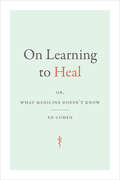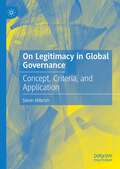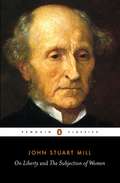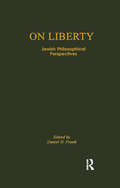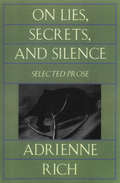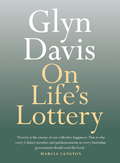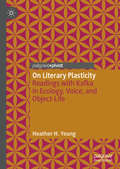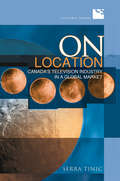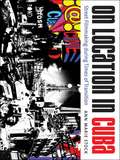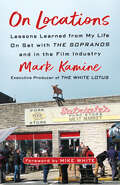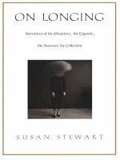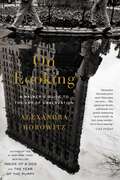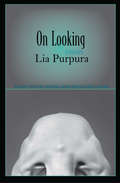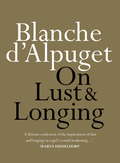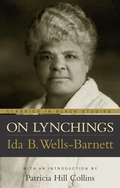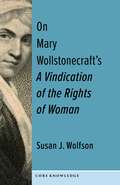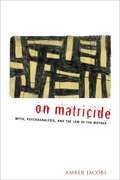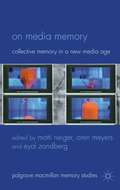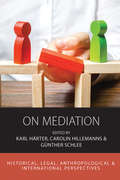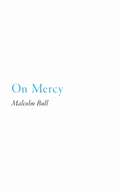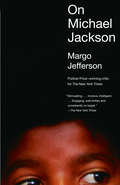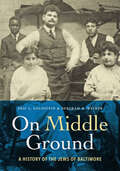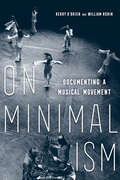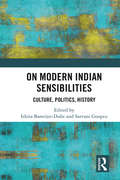- Table View
- List View
On Learning to Heal: or, What Medicine Doesn't Know (Critical Global Health: Evidence, Efficacy, Ethnography)
by Ed CohenAt thirteen, Ed Cohen was diagnosed with Crohn’s disease—a chronic, incurable condition that nearly killed him in his early twenties. At his diagnosis, his doctors told him that the best he could hope for would be periods of remission. Unfortunately, doctors never mentioned healing as a possibility. In On Learning to Heal, Cohen draws on fifty years of living with Crohn’s to consider how Western medicine’s turn from an “art of healing” toward a “science of medicine” deeply affects both medical practitioners and their patients. He demonstrates that although medicine can now offer many seemingly miraculous therapies, medicine is not and has never been the only way to enhance healing. Exploring his own path to healing, he argues that learning to heal requires us to desire and value healing as a vital possibility. With this book, Cohen advocates reviving healing’s role for all those whose lives are touched by illness.
On Legitimacy in Global Governance: Concept, Criteria, and Application
by Sören HilbrichGlobal governance has a major impact on the lives of people around the world. However, traditional theories of legitimacy were usually developed for states and are not suitable for the diversity of global governance institutions that exist today. This book first develops a normative concept of legitimacy that is applicable to all political institutions. According to this concept, to regard an institution as legitimate means ascribing it the right to exercise its function in political practice. Secondly, the book discusses how the use of this concept opens up new perspectives in the debate on legitimacy criteria for global governance institutions. In this context, the book analyses the relationship of legitimacy to the values of justice and democracy and discusses the role of feasibility constraints and the all-affected principle in legitimacy judgements. The concept of legitimacy as the right to function opens up the conceptual space to accommodate the insight that legitimacy criteriaare not the same for all global governance institutions, but depend on their function and context. Thirdly, the book applies the developed theoretical framework to a specific global governance institution, the G20.
On Liberty and the Subjection of Women
by John Stuart MillA prodigiously brilliant thinker who sharply challenged the beliefs of his age, the political and social radical John Stuart Mill was the most influential English-speaking philosopher of the nineteenth century. Regarded as one of the sacred texts of liberalism, his great work On Liberty argues lucidly that any democracy risks becoming a 'tyranny of opinion' in which minority views are suppressed if they do not conform with those of the majority. Written in the same period as On Liberty, shortly after the death of Mill's beloved wife and fellow-thinker Harriet, The Subjection of Women stresses the importance of equality for the sexes. Together, the works provide a fascinating testimony to the hopes and anxieties of mid-Victorian England, and offer a compelling consideration of what it truly means to be free.
On Liberty: Jewish Philosophical Perspectives (Routledge Jewish Studies Series)
by Daniel H. FrankThe communitarian critic of liberalism argues that the socio-political context is fundamental to any understanding of the individual as such. This debate is advanced by particularising it to the experience of Jews in the modern world. Essays focus on the variety of views of the relationships between the individual Jew and the communities, religious and secular, of which he or she is a member.
On Lies, Secrets, and Silence: Selected Prose 1966-1978
by Adrienne RichIn this collection of prose writings, one of America's foremost poets and feminist theorists reflects upon themes that have shaped her life and work. At issue are the politics of language; the uses of scholarship; and the topics of racism, history, and motherhood among others called forth by Rich as "part of the effort to define a female consciousness which is political, aesthetic, and erotic, and which refuses to be included or contained in the culture of passivity."
On Life's Lottery
by Glyn DavisBirth is a throw of the dice. The consequences last a lifetime.We like to think of Australia as the land of the 'fair go', a land of choice and equal opportunity. But behind the facade of meritocracy lies an uncomfortable truth: much of your life is already decided by the lottery of where you are born and who you are born to. Entrenched inter-generational poverty, like the property of the wealthy, can be handed down from parent to child.With one in eight adults and one in six children living below the poverty line in Australia, Glyn Davis asks the question: If life is a game of chance, what responsibility do those who are given a head start have to look after those less fortunate?
On Literary Plasticity: Readings with Kafka in Ecology, Voice, and Object-Life
by Heather H. YeungOn Literary Plasticity: Readings with Kafka in Ecology, Voice, and Object-Life calls to Franz Kafka, and in particular ‘Die Sorge des Hausvaters’, for aid in charting the long reach of plastic on the human mind and world. In this book, Heather H. Yeung builds a past and future ecology of plastic, arguing that it is through a deep reading of literature that we can begin to understand more clearly what it is that plastic means to us today, asking, under the auspices of the idea of literary plasticity: what are the true depths of our twenty-first-century fascination with plastic? How did we become so entangled? How can we come to a better understanding of plastic’s role in our imagination, our environment, and our lives? What can literature teach us in this respect? Why should we care?
On Location
by D. Fairchild RugglesOn Location: Heritage Cities and Sites merges the material and the social perspectives of preservation and historical interpretation in urban landscapes. The essays in this volume focus on the social life of historic cities and large-scale sites. They examine the ways that cities are dynamically changing as they are made and then remade by the people who inhabit or simply visit them, and concentrate on change, pluralism, and fragmentation. The strength of On Location: Heritage Cities and Sites is its comparative approach to both theory and grounded research. It includes an introductory essay that explains the heritage principle under study--the challenges of scale in the environment of a city or large complex--and its development as seen in the policy instruments of ICOMOS, UNESCO, and other major heritage organizations.The combination of wide-ranging case studies (including essays on North America, South America, Central America, the Middle East, and Europe) and the theoretical background make this volume an invaluable asset for researchers in archaeology, urban studies, art and architecture, cultural heritage, public policy, and tourism.
On Location
by Serra TinicFilm and television production are important components of the Canadian economy. In Vancouver, popular American television series like The X-Files and Canadian series like Da Vinci's Inquest have boosted the city's profile as a centre for international and domestic productions. Serra Tinic's On Location is the first empirical analysis of regional Canadian television producers in the context of developing global media markets.Tinic observes that global television production in Vancouver has been a contradictory process that has, on one level, led to the homogenization of culturally specific storylines, while simultaneously facilitating the development of new avenues for international ventures. The author explains how federal and regional network considerations, funding guidelines, and partnerships with international co-producers affect the capacity of Canadian television producers to negotiate culturally specific storylines in the development process. She further interrogates the concepts of globalization, culture, and national identity, and their relationship to broadcasting from the perspectives of members of the television industry themselves, highlighting the extent to which industry practices in Vancouver epitomize current trends in global television production. On Location fills a major gap in contemporary media and cultural studies debates that question the connections between the politics of place, culture, and commerce within the larger context of cultural globalization.
On Location in Cuba: Street Filmmaking During Times of Transition
by Ann Marie StockThe 1990s were a time of dramatic transformation for Cuba. With the collapse of its Cold War relationship with the Soviet Union, the island nation plummeted into an era of scarcity and uncertainty known as the Special Period, a time from which it emerged only slowly in the new century. On Location in Cubaviews these pivotal decades through the lens of cinema. Ann Marie Stock conducted hundreds of interviews and conversations in Cuba to examine individual artists' lives and creative output--including film, video, and audiovisual art. She explores the impact of the Cold War's end, the economic crisis that ensued, and the decentralization of the state's political, economic, and cultural apparatus. Stock focuses on what she calls Street Filmmaking--the production of emerging audiovisual artists who work outside the state film industry--to examine the island's transformation and changing notions of Cuban identity. Employing entrepreneurial approaches to producing art and to negotiating the exigencies of globalization, this younger generation of filmmakers offers fresh perspectives on what it means to be Cuban in an increasingly complex and connected world.
On Locations: Lessons Learned from My Life On Set with The Sopranos and in the Film Industry
by MARK KAMINECelebrating 25 years of The Sopranos: The executive producer of The White Lotus shares how he got his start in film and television production on &“the greatest TV show of all time&” (Rolling Stone)An inside look at the film industry for fans, students, and aspiring professionals — featuring a foreword by Golden Globe and Emmy Award winning creator of The White Lotus, Mike WhiteThis page-turning account of starting at the lowest rung on the production ladder among enormously famous & outrageously demanding people will be devoured for its insights, gossip, humor, & storytelling. Married and with a child, the author takes unpaid gigs to get a foot in the door, and eventually ends up working on all seasons of The Sopranos, often named the best TV show ever.The show's setting and its creator's insistence on accuracy placed the native New Jersey author in the right place at the right time to become part of television history, and to witness the effects of sudden fame and acclaim on the show's principal players.Includes many stories about guest stars like Steve Buscemi, Peter Bogdanovich, and Lauren Bacall, as well as the beloved cast, including new tales of James Gandolfini, who Kamine first meets after David Chase casts him as the Dean of Admissions in the classic first season "College" episode. Later, after he&’s been promoted, Kamine gets the calls from Gandolfini when he's hungover, or still drunk, and might or might not make it to the shoot that day. One night, Kamine tries to prevent Gandolfini from taking a swim in the ocean after they've been drinking all night, telling him it could be dangerous but Jim doesn't listen.Woven in is a personal story of home life and strife, achievement and frustration, anxiety and accomplishment. The book's epilogue brings readers up to the moment as the author, after many more years as an anonymous everyman, eventually enjoys outsize professional success as executive producer of the HBO hit series created by Mike White, The White Lotus.
On Longing: Narratives of the Miniature, the Gigantic, the Souvenir, the Collection
by Susan StewartMiniature books, eighteenth-century novels, Tom Thumb weddings, tall tales, and objects of tourism and nostalgia: this diverse group of cultural forms is the subject of On Longing, a fascinating analysis of the ways in which everyday objects are narrated to animate or realize certain versions of the world. Originally published in 1984 (Johns Hopkins University Press), and now available in paperback for the first time, this highly original book draws on insights from semiotics and from psychoanalytic, feminist, and Marxist criticism. Addressing the relations of language to experience, the body to scale, and narratives to objects, Susan Stewart looks at the "miniature" as a metaphor for interiority and at the "gigantic" as an exaggeration of aspects of the exterior. In the final part of her essay Stewart examines the ways in which the "souvenir" and the "collection" are objects mediating experience in time and space.
On Looking: A Walker's Guide to the Art of Observation
by Alexandra HorowitzFrom the author of the #1 New York Times bestseller Inside of a Dog, this “elegant and entertaining” (The Boston Globe) explanation of how humans perceive their environments “does more than open our eyes...opens our hearts and minds, too, gently awakening us to a world—in fact, many worlds—we’ve been missing” (USA TODAY).Alexandra Horowitz shows us how to see the spectacle of the ordinary—to practice, as Sir Arthur Conan Doyle put it, “the observation of trifles.” Structured around a series of eleven walks the author takes, mostly in her Manhattan neighborhood, On Looking features experts on a diverse range of subjects, including an urban sociologist, the well-known artist Maira Kalman, a geologist, a physician, and a sound designer. Horowitz also walks with a child and a dog to see the world as they perceive it. What they see, how they see it, and why most of us do not see the same things reveal the startling power of human attention and the cognitive aspects of what it means to be an expert observer.Page by page, Horowitz shows how much more there is to see—if only we would really look. Trained as a cognitive scientist, she discovers a feast of fascinating detail, all explained with her generous humor and self-deprecating tone. So turn off the phone and other electronic devices and be in the real world—where strangers communicate by geometry as they walk toward one another, where sounds reveal shadows, where posture can display humility, and the underside of a leaf unveils a Lilliputian universe—where, indeed, there are worlds within worlds within worlds.
On Looking: Essays
by Lia Purpura"Purpura is the real deal, and so is every successive sentence in this collection. A cornucopiac vocabulary is married to a strict economy of expression; an offbeat curiosity is married to the courage of difficult witnessing. . . ."--Albert Goldbarth"Purpura's prose is a system of delicate shocks--leaps and connections and syncopated revelations, all in the service of the spirit negotiating the truth of its experience."--Sven BirkertsLia Purpura's daring new book of lyric essays, On Looking, is concerned with the aesthetics and ethics of seeing. In these elegantly wrought meditations, patterns and meanings emerge from confusion, the commonplace grows strange and complex, beauty reveals its flaws, and even the most repulsive object turns gorgeous. Purpura's hand is clearly guided by poetry and behaves unpredictably, weaving together, in one lit instance, sugar eggs, binoculars, and Emerson's words: "I like the silent church before the sermon begins."In "Autopsy Report," Purpura takes an intimate look at the ruin of our bodies after death, examining the "dripping fruits" of organs and the spine in its "wet, red earth." A similar reverence is held for the alien jellyfish in "On Form," where she notes that "in order to see their particular beauty...we have to suspend our fear, we have to love contradiction." Her essays question art and its responses as well as its responsibilities, challenge familiar and familial relationships, and alter the borders between the violent and the luminous, the harrowing and the sensual. Above all, Purpura's essays are a call to notice. She is writer-as-telescope, kaleidoscope, microscope, and mirror. As she says: "By seeing I called to things, and in turn, things called me, applied me to their sight and we became each as treasure, startling to one another, and rare." This is, indeed, a rare and startling treasure of a book.Lia Purpura is the author of Increase (essays), Stone Sky Lifting (poems), The Brighter the Veil (poems), and Poems of Grzegorz Musial: Berliner Tagebuch and Taste of Ash (translations). Her awards include a National Endowment for the Arts Fellowship in Prose, a Pushcart Prize, a Fulbright Fellowship, the Associated Writing Programs Award in Creative Nonfiction, and the Ohio State University Press/The Journal Award in Poetry. Her poems and essays have appeared in Agni, DoubleTake, The Georgia Review, The Iowa Review, Parnassus: Poetry in Review, Ploughshares, and elsewhere. She is Writer-in-Residence at Loyola College in Baltimore, Maryland, and teaches at the Rainier Writing Workshop MFA Program in Tacoma, Washington.
On Lust & Longing
by Blanche d'AlpugetOn Lust & Longing brings two of Blanche D'Alpuget's prominent works together. When On Lust was first published it caused a media sensation: d'Alpuget wrote of a pillar of society who had molested children and of events that ended in mystery. She revealed all. On Longing caused a similar sensation, for different reasons. D'Alpuget dared to write that she loved and had inspired love in a man already adored by the public. Here are the raw and timeless themes of the power and powerlessness inherent to lust, love, loss and death.
On Lynchings
by Ida B. Wells-BarnettThis book of Southern Horrors, A Red Record, and Mob Rule in New Orleans, three of Wells-Barnett's important works on lynching, makes important contributions to our understanding of Wells-Barnett's place within African American social and political thought.
On Mary Wollstonecraft's A Vindication of the Rights of Woman: The First of a New Genus (Core Knowledge)
by Susan J. WolfsonMary Wollstonecraft’s A Vindication of the Rights of Woman (1792) made a pioneering and durably influential argument for women’s equality. Emerging from the turbulent decade of the French Revolution, her vindication delivered a systematic critique of the treatment of women across time and place. Drawing on extensive experience teaching and writing about Wollstonecraft, Susan J. Wolfson offers new insight into how Wollstonecraft’s particular methods, style, and energy make this case for her readers.Wolfson places this polemic in its political and literary contexts and in relation to Wollstonecraft’s other works about political rights. She considers how Wollstonecraft balanced advocacy for the seemingly universal ideals of the French Revolution with analysis of the gendered exclusions in the vaunted rights of “man.” This book pays particular attention to Wollstonecraft’s literary craft, highlighting the force of her close reading. Wollstonecraft pinpointed the role of gendered phrases and concepts in political discourse, both in her opponents’ metaphors and received ideas and in her own efforts to craft a new political language with which to defend women’s capabilities. Wolfson reveals her as a pioneer in decoupling sex from gender and shows how she provided an enduring model of how to be a female intellectual. Sharing the excitement of reading Wollstonecraft’s work with care for her literary as well as political genius, this book provides fresh perspectives both for first-time readers and those seeking a nuanced appreciation of her achievements.
On Matricide: Myth, Psychoanalysis, and the Law of the Mother
by Amber JacobsDespite advances in feminism, the "law of the father" remains the dominant model of Western psychological and cultural analysis, and the law of the mother continues to exist as an underdeveloped and marginal concept. In her radical rereading of the Greek myth, Oresteia, Amber Jacobs hopes to rectify the occlusion of the mother and reinforce her role as an active agent in the laws that determine and reinforce our cultural organization.According to Greek myth, Metis, Athena's mother, was Zeus's first wife. Zeus swallowed Metis to prevent her from bearing children who would overthrow him. Nevertheless, Metis bore Zeus a child-Athena-who sprang forth fully formed from his head. In Aeschylus's Oresteia, Athena's motherless status functions as a crucial justification for absolving Orestes of the crime of matricide. In his defense of Orestes, Zeus argues that the father is more important than the mother, using Athena's "motherless" birth as an example. Conducting a close reading of critical works on Aeschylus's text, Jacobs reveals that psychoanalytic theorists have unwittingly reproduced the denial of Metis in their own critiques. This repression, which can be found in the work of Sigmund Freud and Melanie Klein as well as in the work of more contemporary theorists such as André Green and Luce Irigaray, has resulted in both an incomplete analysis of Oresteia and an inability to account for the fantasies and unconscious processes that fall outside the oedipal/patricidal paradigm. By bringing the story of Athena's mother, Metis, to the forefront, Jacobs challenges the primacy of the Oedipus myth in Western culture and psychoanalysis and introduces a bold new theory of matricide and maternal law. She finds that the Metis myth exists in cryptic forms within Aeschylus's text, uncovering what she terms the "latent content of the Oresteian myth," and argues that the occlusion of the law of the mother is proof of the patriarchal structures underlying our contemporary social and psychic realities. Jacobs's work not only provides new insight into the Oresteian trilogy but also advances a postpatriarchal model of the symbolic order that has strong ramifications for psychoanalysis, feminism, and theories of representation, as well as for clinical practice and epistemology.
On Media Memory
by Motti Neiger Oren Meyers Eyal ZandbergThis volume offers a comprehensive discussion of Media Memory and brings Media and Mediation to the forefront of Collective Memory research. The essays explore a diversity of media technologies (television, radio, film and new media), genres (news, fiction, documentaries) and contexts (US, UK, Spain, Nigeria, Germany and the Middle East).
On Mediation: Historical, Legal, Anthropological and International Perspectives (Integration and Conflict Studies #22)
by Karl Härter, Carolin Hillemanns, and Günther SchleeExploring mediation and related practices of conflict regulation, this book takes an interdisciplinary approach that includes historical, legal, anthropological and international perspectives. Divided into three sections, the volume observes historical and current relations between mediation and the criminal justice system and provides anthropological perspectives and case studies to explore mediation and arbitration in international arenas. In this regard, the book provides an innovative perspective on mediation and new insights into conflict regulation.
On Mercy
by Malcolm BullIs mercy more important than justice?Since antiquity, mercy has been regarded as a virtue. The power of monarchs was legitimated by their acts of clemency, their mercy demonstrating their divine nature. Yet by the end of the eighteenth century, mercy had become “an injustice committed against society . . . a manifest vice.” Mercy was exiled from political life. How did this happen?In this book, Malcolm Bull analyses and challenges the Enlightenment’s rejection of mercy. A society operating on principles of rational self-interest had no place for something so arbitrary and contingent, and having been excluded from Hobbes’s theory of the state and Hume’s theory of justice, mercy disappeared from the lexicon of political theory. But, Bull argues, these idealised conceptions have proved too limiting. Political realism demands recognition of the foundational role of mercy in society. If we are vulnerable to harm from others, we are in need of their mercy. By restoring the primacy of mercy over justice, we may constrain the powerful and release the agency of the powerless. And if arguments for capitalism are arguments against mercy, might the case for mercy challenge the very basis of our thinking about society and the state?An important contribution to contemporary political philosophy from an inventive thinker, On Mercy makes a persuasive case for returning this neglected virtue to the heart of political thought.
On Michael Jackson: On The Wall
by Margo JeffersonMichael Jackson was once universally acclaimed as a song-and-dance man of genius; Wacko Jacko is now, more often than not, dismissed for his bizarre race and gender transformations and confounding antics, even as he is commonly reviled for the child molestation charges twice brought against him. Whence the weirdness and alleged criminality? How to account for Michael Jackson’s rise and fall? InOn Michael Jackson—an at once passionate, incisive, and bracing work of cultural analysis—Pulitzer Prize–winning critic forThe New York Times Margo Jeffersonbrilliantly unravels the complexities of one of the most enigmatic figures of our time. Who is Michael Jackson and what does it mean to call him a “What Is It”? What do P. T. Barnum, Peter Pan, and Edgar Allan Poe have to do with our fascination with Jackson? How did his curious Victorian upbringing and his tenure as a child prodigy on the “chitlin’ circuit” inform his character and multiplicity of selves? How is Michael Jackson’s celebrity related to the outrageous popularity of nineteenth-century minstrelsy? What is the perverse appeal of child stars for grown-ups and what is the price of such stardom for these children and for us? What uncanniness provoked Michael Jackson to become “Alone of All His Race, Alone of All Her Sex,” while establishing himself as an undeniably great performer with neo-Gothic, dandy proclivities and a producer of visionary music videos? What do we find so unnerving about Michael Jackson’s presumed monstrosity? In short, how are we all of us implicated? In her stunning first book, Margo Jefferson gives us the incontrovertible lowdown on call-him-what-you-wish; she offers a powerful reckoning with a quintessential, richly allusive signifier of American society and popular culture. From the Hardcover edition.
On Middle Ground: A History of the Jews of Baltimore
by Eric L. Goldstein Deborah R. WeinerA model of Jewish community history that will enlighten anyone interested in Baltimore and its past.Winner of the Southern Jewish Historical Society Book Prize by the Southern Jewish Historical Society; Finalist of the American Jewish Studies Book Award by the Jewish Book Council National Jewish Book AwardsIn 1938, Gustav Brunn and his family fled Nazi Germany and settled in Baltimore. Brunn found a job at McCormick’s Spice Company but was fired after three days when, according to family legend, the manager discovered he was Jewish. He started his own successful business using a spice mill he brought over from Germany and developed a blend especially for the seafood purveyors across the street. Before long, his Old Bay spice blend would grace kitchen cabinets in virtually every home in Maryland. The Brunns sold the business in 1986. Four years later, Old Bay was again sold—to McCormick. In On Middle Ground, the first truly comprehensive history of Baltimore’s Jewish community, Eric L. Goldstein and Deborah R. Weiner describe not only the formal institutions of Jewish life but also the everyday experiences of families like the Brunns and of a diverse Jewish population that included immigrants and natives, factory workers and department store owners, traditionalists and reformers. The story of Baltimore Jews—full of absorbing characters and marked by dramas of immigration, acculturation, and assimilation—is the story of American Jews in microcosm. But its contours also reflect the city’s unique culture.Goldstein and Weiner argue that Baltimore’s distinctive setting as both a border city and an immigrant port offered opportunities for advancement that made it a magnet for successive waves of Jewish settlers. The authors detail how the city began to attract enterprising merchants during the American Revolution, when it thrived as one of the few ports remaining free of British blockade. They trace Baltimore’s meteoric rise as a commercial center, which drew Jewish newcomers who helped the upstart town surpass Philadelphia as the second-largest American city. They explore the important role of Jewish entrepreneurs as Baltimore became a commercial gateway to the South and later developed a thriving industrial scene.Readers learn how, in the twentieth century, the growth of suburbia and the redevelopment of downtown offered scope to civic leaders, business owners, and real estate developers. From symphony benefactor Joseph Meyerhoff to Governor Marvin Mandel and trailblazing state senator Rosalie Abrams, Jews joined the ranks of Baltimore’s most influential cultural, philanthropic, and political leaders while working on the grassroots level to reshape a metro area confronted with the challenges of modern urban life. Accessibly written and enriched by more than 130 illustrations, On Middle Ground reveals that local Jewish life was profoundly shaped by Baltimore’s "middleness"—its hybrid identity as a meeting point between North and South, a major industrial center with a legacy of slavery, and a large city with a small-town feel.
On Minimalism: Documenting a Musical Movement
by Kerry O’Brien and William RobinA revisionist history of minimalism's transformative rise, through the voices of the musicians who created it. When composers like Philip Glass and Steve Reich began creating hypnotically repetitive music in the 1960s, it upended the world of American composition. But minimalism was more than a classical phenomenon—minimalism changed everything. Its static harmonies and groovy pulses swept through the broader avant-garde landscape, informing the work of Yoko Ono and Brian Eno, John and Alice Coltrane, Pauline Oliveros and Julius Eastman, and many others. On Minimalism moves from the style's beginnings in psychedelic counterculture through its present-day influences on ambient jazz, doom metal, and electronic music. The editors look beyond the major figures to highlight crucial and diverse voices—especially women, people of color, and LGBTQ+ musicians—that have shaped the genre. Featuring more than a hundred rare historical sources, On Minimalism curates this history anew, documenting one of the most important musical movements of our time.
On Modern Indian Sensibilities: Culture, Politics, History
by Ishita Banerjee-Dube Sarvani GooptuThis book consists of incisive and imaginative readings of culture, politics, and history – and their intersections – in eastern India from the 16th to the 20th century. Focusing especially on Assam, Odisha, Bengal, and their margins, the volume explores Indo-Islamic cultures of rule as located on the cusp of Mughal-cosmopolitan and regional–local formations. Tracking sensibilities of time and history, senses of events and persons, and productions of the past and the present, the volume unravels intimate expressions of aesthetics and scandals, heroism and martyrdom, and voice and gender. It examines key questions of the interchanges between literary cultures and contending nationalisms, culture and cosmopolitanism, temporality and mythology, literature and literacy, history and modernity, and print culture and popular media. The book offers grounded and connected accounts of a large, important region, usually studied in isolation. It will be of interest to scholars and students of history, literature, politics, sociology, cultural studies, and South Asian studies.
